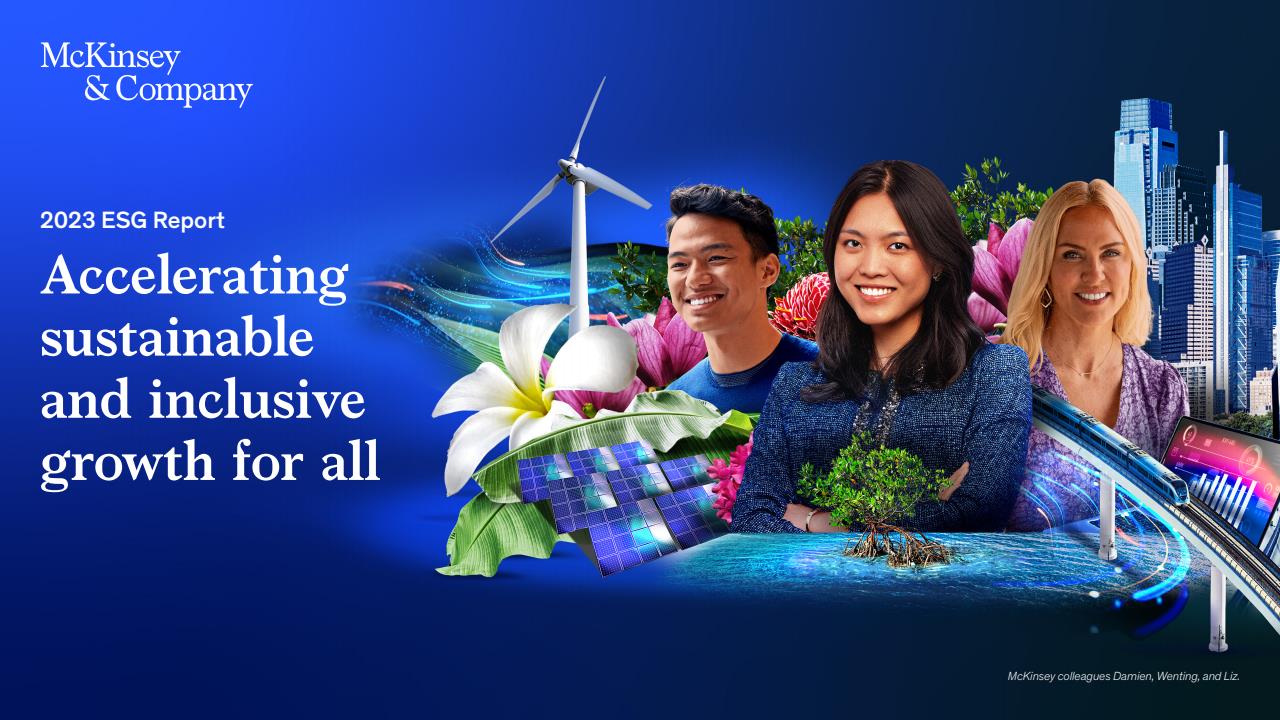On this page: Opportunity | Solution | Impact
The Opportunity
Scaling the path to net zero
The voluntary carbon market makes it possible for companies to take climate action around emissions they cannot immediately abate. A growing number of companies with long-term carbon reduction strategies are turning to carbon credits to hold themselves accountable for their more immediate carbon footprint. As a result, demand is expected to increase 15-fold by 2030 and 100-fold by 2050, according to the Taskforce on Scaling Voluntary Carbon Markets, a private-sector-led initiative informed by McKinsey knowledge and advisory support. Within the next decade, the overall market for carbon credits is estimated to be worth upwards of $50 billion.
And yet, the process for identifying, vetting, buying, and managing carbon credits around the world has proven labor-intensive and hard to scale for many companies. It often requires them to conduct their own due diligence for each project they consider funding. This nascent market includes an evolving and often subjective definition of quality, varying degrees of carbon removal permanence, lack of price transparency, and uncalculated risk.
In the face of such growing demand and complexity, the private equity firm and global alternative asset manager TPG saw the need for a more sophisticated approach to accessing carbon markets. Leadership at TPG Rise Climate, TPG’s dedicated climate-focused private equity fund, saw an opportunity to leverage the tools of more mature markets—diversification, active management, and risk management—to address barriers to scaling efficient voluntary carbon markets. They partnered with McKinsey to build a new platform that would fill critical gaps in the market.
“Voluntary carbon markets can be a powerful tool to allocate capital from those with a high cost of carbon to high-impact projects with a lower cost of carbon. But these nascent markets were opaque and difficult to navigate for many participants,” says McKinsey partner Sean Kane. “TPG and McKinsey asked: How can we partner to build the next generation carbon platform and do it fast enough to create a market leader in a rapidly evolving space?”
McKinsey worked with TPG to create Rubicon Carbon , an easy-to-use, transparent, enterprise-grade digital platform that offers innovative, high-quality corporate carbon products at scale in order to accelerate global sustainability and carbon removal.

From idea to impact
From transforming your performance to powering new growth, we turn your ambition into action. We know what it takes. We do it every day.
The Solution
An innovative risk-adjusted carbon credit portfolio
Over the course of less than 12 months, we worked alongside TPG to build and launch the Rubicon Carbon platform, applying a real capital markets approach to innovation in carbon markets. This included market research and segmentation, developing the business and product concept, using Business Building strategies, business planning and execution, and helping secure sponsor launch funding.

The work centered on establishing Rubicon Carbon as an enterprise-grade partner that brings sophisticated capabilities to corporate customers so that they don’t have to reinvent the wheel for every carbon credit transaction.
Priorities to get there included coming up with a science-based approach to identifying high-quality credits, vetting the numerous attributes that drive quality and value to customers, and navigating the shifting landscape of risks in the market by actively managing baskets of credits over their life cycle.
“Carbon credits are exposed to different risks that can make their environmental benefits challenging to estimate, especially over time,” says Rubicon Carbon chief science officer Dr. Jennifer Jenkins. “By including a diversified portfolio of carbon projects, applying rigorous quality guardrails, and conducting ongoing monitoring and risk adjustments, we’re able to lower the risk assumed by buyers.”
Moving from projects to products and portfolios is a unique innovation here. Rubicon follows innovation from the financial markets where professional managers develop and manage high-quality portfolios for investors.
Over the course of six months, our team helped co-create a tech infrastructure and platform that integrated transaction management, carbon credit custody, customer portfolio management, and full enterprise technology architecture. The work included corporate onboarding and accounted for the necessary compliance features along with bespoke carbon credit purchasing and inventory management.
“Moving from projects to products and portfolios is a unique innovation here,” says McKinsey associate partner Charles Riesenberg. “Previously, buyers in the market had to find and diligence individual carbon credit projects in different parts of the world, which creates an incredibly complex market. Rubicon follows innovation from the financial markets where professional managers develop and manage high-quality portfolios for investors.”
The Impact
Connecting companies to meaningful climate projects
TPG and Rubicon Carbon accelerated the platform’s time to market and customer acquisition over the course of six months. In addition to overseeing the asset management platform build, McKinsey helped refine the product and offering strategy, designed initial product portfolios, and helped design the new company’s org structure.
What began as 25 full-time employees, two MVP products, and a coalition of 15 corporate launch partners (including McKinsey), has now grown to become a market leader in next-generation carbon solutions including four distinct product offerings and a $1 billion capital mobilization goal. Rubicon Carbon has created a reliable way for companies with long-term carbon reduction goals to make a more immediate impact in offsetting their emissions.
It's already making a difference around the world. For example, through one project alone, 150,000 hectares have been preserved in Borneo. Elsewhere, methane emissions are being cut in Bangladesh, and 5,000 acres in Africa are being reforested to expand the habitat for endangered gorillas.
"It’s clear that companies must reduce emissions within their value chain, but to balance remaining emissions that can't be eliminated right now, we also need to scale high-quality carbon credits,” says Rubicon Carbon CEO Thomas Montag. "Rubicon Carbon helps direct corporate funds toward meaningful climate projects in need of capital and moves us closer to reaching the ambitious net zero goals our planet needs."
Tech that moves everything
Let’s Connect

Sean Kane
PartnerSouthern California





